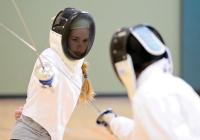Twin Peaks Charter Academy junior Rachelle Fagerburg swipes her sword toward the ground in salute to her bouting partner and lowers her mask to cover her face.
She lunges forward in the ready position pointing the tip of her sword, or foil, at her partner.
If you go
What: Twin Peaks team fencing tournament
When: 3:15 to 5 p.m. Tuesday
Where: Twin Peaks Charter Academy gym, 340 S Sunset St., Longmont
Cost: $2
Contact: coach James Bekins at bekins_james@svvsd.org
“When the mask goes on and the sword comes up, I have to win,” Rachelle said.
Rachelle, 17, is learning how to fence as part of the Twin Peaks Charter Academy’s fencing club.
The club was launched last spring by teacher James Bekins, the high school’s social studies department chair, and is believed to be the only high school fencing club in Colorado.
School districts in Denver, Jefferson, Douglas and Adams counties and the Boulder Valley School District confirmed that they did not have any fencing clubs, though some schools have hosted fencing workshops. There used to be a fencing club at Chaparral High School in Douglas County which is currently inactive, Bekins said.
When he was a freshman at the University of Colorado in Boulder Bekins noticed a group of students fighting each other with swords. Bekins had never seen a fencing bout, or match, in person but he was immediately intrigued by the medieval sport and joined the campus fencing club.
“Once I had a sword in my hand I was hooked,” Bekins said. “I like the order and organization, controlling the movements.”
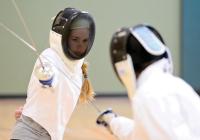
In the fall of 2012, shortly after Bekins started teaching at Twin Peaks, he pitched the idea of a fencing club to the school’s board of directors, which approved the club to launch that spring.
The club kicked off with 11 members and has 11 members again this year.
Bekins said he started the club as a way to share his passion with students and provide an opportunity for students who did not find their niche in traditional sports.
“This is an opportunity to express yourself for those kids who are not the typical athlete,” Bekins said. “Fencing can still give students the same benefit as traditional sports by showing them they have some worth and that they can accomplish something and be successful.”
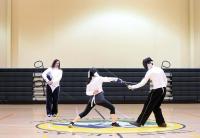
Besides giving students a sense of accomplishmen, Bekins said, the sport also provides a lesson in respect for the young members.
“It’s also about keeping respect and chivalry alive,” he said. “That’s something that isn’t charished today like it once was, but it’s still an important lesson to pass on to these kids.”
Twin Peaks junior Evan Young, 17, is in his second year with the club and can’t get enough of the surprise look on his opponents face when he performs a perfect disengage move.
“It’s an amazing feeling when you have the sword in your hand,” said Young, a junior at Twin Peaks. “It’s a great way to get out some anger or frustration in a non-violent way.”
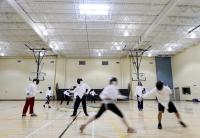
Fencing is one of the safest Olympic sports, according to a study by the American Journal of Sports Medicine of sports injuries during the 2008 Olympic games. Only five other sports had a lower risk of injury for its athletes including synchronized swimming and rowing, according to the report.
Athletes competing in table tennis events were more likely to incur an injury than athletes competing in fencing.
The students meet twice a week during the spring semester to practice, which usually includes running, stretching, footwork and bouts, and compete in tournaments against each other since there are so few fencers in the area, Bekins said.
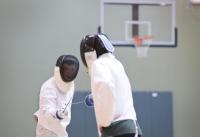
Twin Peak students have practiced with the college fencing clubs at CU-Boulder and the University of Northern Colorado, but the lack of high school clubs makes it difficult to find competitors, he said.
Most fencers in Colorado are members of independent clubs like Boulder-based Northern Colorado Fencers, which is focused on training young athletes to compete in national and world fencing competitions, said club founder and head coach Gary Copeland.
The club has about 75 members, mostly children ages 7 to 18, from Westminster to Fort Collins.
The typically-European sport has grown in popularity in the United States during the past decade, tripling the number of competitive fencers from 5,000 to 15,000, Copeland said. But Colorado has not followed the trend.
“We’re not seeing the same growth here,” he said. “It’s been pretty stagnant.”
The small fencing community in Colorado is an inconvenience for some, especially coaches like Copeland who are looking for the nation’s best talent. But there are some advantages to maintaining a small community, said James Holtz, assistant coach of the Twin Peaks club.
“The fencing community in Colorado has to try harder to even find access so they’re going out of their way to make it work for them,” Holtz said. “It’s a hurdle for some but it also means that those who are doing it are already more committed.”
Fencing is a NCAA and Olympic sport, and gained the most traction along the coast including New York, the Bay area and Houston, where populations are more dense and European immigrants are more likely to settle, Copeland said.
Copeland fell in love with the sport when he was 18 and lived in California but he was plagued by the speed and precision needed to perfect the techniques.
“I’m too slow to be good at this sport,” Copeland said. “But it’s so much fun and I love it so I stuck with it and focused on becoming a very good coach.”
Unlike the Twin Peaks club, which seeks to provide access to the lesser-known sport, Copeland is looking for committed students that he can mold into national and world champions.
Besides being a difficult sport that requires mental and physical sharpness, Copeland said, America’s culture of immediate gratification turns off many young students.
“Delayed gratification is a problem in our society today,” Copeland said. “You have to be patient, and willing to delay gratification usually for years before you start to look good as a fencer and start winning for reasons other than dumb luck.”
The commitment and drive needed to become a great fencer is especially challenging for young children, Copeland said, and requires specific personality traits — characteristics that came naturally to Boulder native Nina Van Loon.
Van Loon, a sophomore at Harvard University, was introduced to fencing at a summer camp when she was 9-years-old and 10 years later she is reaping the rewards of a decade of hard work.
In April, the 19-year-old competed with the U.S. epee team, which won second place at the Junior World Championships, and finished 41st individually.
“The team win was one of my best moments so far,” she said. “It takes a long time to get anywhere because there are so many technical skills you have to master, precise techniques that take years to master but then there are those moments that pay off.”
This was Van Loon’s final competition in the junior age brackets, which means she will bump up to adult categories soon and move back to the bottom of the talent pool, she said. Narrow age brackets make it difficult for students to stay on top very long before they have to move to the next bracket pushing them back down on the fencing food chain.
Her strong competitive nature and “killer instinct” are the traits that Copeland saw in Van Loon early on, and the ones she will need most as she prepares to leave Harvard to focus on fencing full-time.
At the end of the spring semester, Van Loon will take a two year leave of absence from school and from Harvard’s fencing team to pursue a spot on the 2016 U.S. Olympic fencing team.
Since there are no sponsorship opportunities for American fencers, Van Loon will look to her parents and her savings account to support her while she focuses on fencing. After a few months of training in New York, Van Loon will head to Europe to continue training as she competes for a spot on the Olympic team.
“The Olympics isn’t the goal,” Van Loon said. “It would be great but it’s really about the personal journey and working as hard as I possibly can at something.”
Contact Times-Call community reporter Whitney Bryen at 303-684-5274 or wbryen@times-call.com

